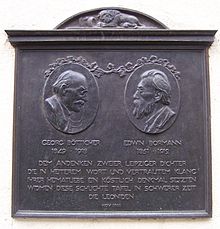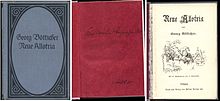Georg Bötticher

Georg Bötticher (born May 20, 1849 in Jena , † January 15, 1918 in Leipzig ) was a German graphic artist , writer and publisher .
Life
Georg Bötticher was the second son of pastor Hans Adam Bötticher (1811–1849), who died in March 1849 in Görmar near Mühlhausen in Thuringia, and his wife Clementine Bötticher was born in Hand. After the death of her husband, Clementine and her older son Karl moved into their parents' house in Jena. Georg Bötticher's maternal grandfather was the Privy Councilor, Professor Ferdinand Gotthelf Hand , who became known as a philologist and musicologist. Hand had taught the Weimar princesses Augusta and Maria, had headed a singing club for years and wrote a notable aesthetic of music . As a young professor in Weimar, he still served under Goethe.
In general, Georg Bötticher came from a very traditional and traceable family whose roots can be traced back to 1365. The philosopher and orientalist Paul de Lagarde (1827-1891) belong to this family; his real name was Paul Anton Bötticher. The former mayor of Goldingen (today Kuldiga / Latvia) Friedrich von Boetticher (1749–1819), the co-founder and editor of the “Baltic Monthly” Theodor von Boetticher (1819–1901), the founder and manager of a publishing and art bookstore Friedrich von Boetticher (1820–1902), the ship's doctor and military doctor and later head of a sanatorium Theodor von Boetticher (1869–1932) and other recognized personalities of the Bötticher / von Boetticher family.
Georg Bötticher grew up in the house of his grandparents in Jena and attended the Zenker Institute during his primary school days. From 1856 he moved to the Masonic Institute in Dresden to continue his school lessons, which he completed in 1863. Subsequently, he learned the profession of pattern draftsman at the Dresden Polytechnic, which later became the arts and crafts school. He completed his apprenticeship in 1866 and now attended the weaving school in Chemnitz for a year, where he also worked as a volunteer in a wool factory. In order to deepen his professional education he worked from 1869 in the leading Parisian art business of Artur Martins. However, shortly after the outbreak of the Franco-German War in 1870, he had to leave France.
Back in Germany he worked as a draftsman in Mühlhausen, Thuringia. At about the same time he began his literary work and made his debut as a writer for children and young people in the magazine Deutsche Jugend . He then moved to Dresden, where he worked as a decorative artist for wallpapers, carpets, upholstery fabrics and book covers. It was here that his work “Original-Compositionen zu Flachmustern”, which is highly recognized in specialist circles, was created and published in Dresden. Other places of activity in his profession were Mannheim and Jena until he moved to Wurzen in 1875 to take up a job in a wallpaper factory as a draftsman for sample designs for the manufacture of wallpaper, furniture fabrics and carpets. After he had established himself in this position, he married Rosa Marie (Maria) Engelhart in Jena in 1876. In the years that followed, the children Wolfgang (1879–1946), Ottilie, later married Mitter (1882–1957) and Hans (1884–1934), who later called himself a writer and cabaret artist Joachim Ringelnatz , emerged from the marriage.
Georg Bötticher was a very successful draftsman who, in his heyday, delivered drafts and templates to France (Paris), Sweden, Russia and America. In the mid-1870s he also went on to regular literary publications, some of which he published in the Saxon dialect and under the pseudonym C.Engelhart (the name of his wife). This was followed by texts for picture books with illustrations by graphic artists from his circle. Moved to Leipzig with the family in 1897, where he published The Chinese Book with illustrations by Rudolf Alfred Jaumann . The art scene, which is much more established in Leipzig, and the great interest in his work particularly suited him. More of his books How the Soldiers Wanted to Become Animals (1892) appeared here, together with illustrations by his friend Fedor Flinzer , “Der Deutsche Michel”, “Allotria” and in 1895 “The funny Jena”. He also wrote a book about his family with the title “Meine Lieben”, which appeared in 1897. This was followed by “Ballads, Legends and Schwänke” and, together with L. Meggendorfer, in 1899 the book “The quick-change artist”.
However, from around 1900 he was plagued by an eye ailment that disadvantaged his eyesight and prevented him more and more from working at the drawing table. Therefore he switched more and more to the literary field. Georg Bötticher was the editor of Auerbach's German Children's Calendar from 1901 to 1918 . He worked in the circle of the "Ekkehard" poets and was an ardent advocate of Otto von Bismarck . In addition, he devoted himself to literary history contributions on Johann Wolfgang Goethe and Joseph Victor von Scheffel . He also worked for the humorous magazines Fliegende Blätter and Meggendorfer Blätter as well as for Die Jugend . Bötticher took an active part in the cultural life of his time. Not only the satirical work is characteristic of him, but also the confrontation with individual fellow human beings, the literary processing of behavioral norms, as in the book "Rules of Society" and he created the literary figure of "Lieutenant von Versewitz". From 1901 to 1905 "The lyrical diary of the lieutenant von Versewitz" appeared in three volumes. Altogether more than 40 published books from his pen are known. Their names are mostly chosen as "cheerful" such as "Allotria", "Alfanzerei", "Schnick-Schnack" and many more. Everything flowed out of hand quite easily. But he also wrote ballads, short stories and, in later years, essays on cultural and literary history.
Especially during his time in Leipzig he maintained a large circle of friends, including the writer Edwin Bornmann (1851-1912), the poet Victor Blüthgen (1844-1920), the writer Julius Lohmeyer (1834-1903), the graphic artist Julius Kleinmichel ( 1846–1892), the sculptor Max Klinger (1857–1920), the poet Detlev von Liliencron (1844–1909), the journalist Julius Stinde (1841–1905), the sculptor Carl Seffner (1861–1932) and the writer Johann Trajan (1837–1952) belonged. He led a lively correspondence with the writer Theodor Fontane (1819–1899), the writer Gustav Freytag (1816–1895), the poet Emanuel Geibel (1815–1884), the writer Paul Heyse (1830–1914), the painter Adolf Menzel (1815–1905), the poet Conrad Ferdinand Meyer (1825–1898) and the writer Wilhelm Raabe (1831–1910). In 1909, together with Edwin Bormann and Arthur von Oettingen, he founded the Leipzig Artists' Association of the Leonids .
On January 15, 1918, Bötticher died in Leipzig after only four days of flu. He was buried in the New Johannisfriedhof in Leipzig in the grave of his mother.
Aftermath
A year after his death, a plaque of the "Leonids" Edwin Bormann and Georg Bötticher was placed on the Leipzig town hall in honor of him . At the inauguration on April 16, 1919, his son Joachim Ringelnatz spoke the poem “Young to Old 1919”. Part of the artistic estate of Georg Bötticher, including numerous designs for samples, are in the collections of the Grassi Museum in Leipzig. In 2010, a new compilation of Georg Bötticher's poems appeared , with a cover graphic by Udo Degener , edition grillenfänger, Udo Degener Verlag, Potsdam 2010, ISBN 978-3-940531-17-9 .
Works
- Original compositions for flat patterns. Wallpaper, fabric, inlays etc. Dresden 1875.
- School reminders. Leipzig 1877.
- with RA Jaumann: The Chinese Book. Leipzig 1898.
- with F. Flinzer: How the soldiers wanted to become animals. Leipzig 1892.
- with F. Flinzer: The German Michel. Leipzig 1892.
- Allotria. Leipzig 1893.
- Funny Jena. Leipzig 1895.
- My dear. Leipzig 1897.
- Ballads, legends, rascals. Leipzig 1898.
- with L. Meggendorfer: The quick-change artist. Esslingen 1899.
- Quirky guys and other humoresques. Leipzig 1900.
- Colorful series. Leipzig 1900.
- The lyrical diary of Lieutenant von Versewitz. Volumes 1 to 3, Leipzig 1901 to 1905.
- Auerbach's German children's calendar. Leipzig from 1901 to 1918.
- All kinds of frills. Leipzig 1905.
- with F. Flinzer: Spatz, Ente und Has´. Nuremberg 1904.
- Bismarck as censor. 1907.
- Happy hours. 1909.
- with L. Otto: Alfranzerei and Allotria. without location and year information
- Poems. edition grillenfänger, Udo Degener Verlag, Potsdam 2010, ISBN 978-3-940531-17-9 .
literature
- Sabine Jung, Angelika Wilhelm: Masterful - Exemplary. Georg Bötticher - the almost forgotten artist and father of Joachim Ringelnatz . Published by the city of Wurzen as a catalog for the exhibition of the same name from May 15 to September 18, 2011 on the occasion of the 1050th anniversary of the city of Wurzen. Wurzen 2011, ISBN 978-3-9814317-1-1 .
- Herbert Günther : Joachim Ringelnatz in personal reports and photo documents. (= rororo. 50096). 8th edition. Rowohlt, Reinbek 2001, ISBN 3-499-50096-5 .
Web links
- Fedor Bochow: Georg Bötticher . In: Institute for Saxon History and Folklore (Ed.): Saxon Biography .
- History of the Leonids
- Works by Georg Bötticher in the Gutenberg-DE project
- Works by and about Georg Bötticher in the German Digital Library
Individual evidence
- ↑ Biography of Georg Bötticher, in: www.deutsche-biographie.de/pnd11622651X.html
- ↑ Herbert Günther: Joachim Ringelnatz in self-testimonies and image documents. P. 12.
- ^ Foundation of the family association in 1904 under the chairmanship of Dr. Heinrich von Boetticher. The first meeting of the family association took place in Riga in 1906, since then “News about the von Boetticher family” has appeared at irregular intervals.
- ↑ Georg Bötticher, "Memories, written down since 1910" (was in the possession of the daughter Ottilie Mitter) in: Herbert Günther: Joachim Ringelnatz in personal testimonies and photo documents. Rowohlt Verlag, Hamburg 2011, p. 12ff.
- ^ Franz Brümmer: Lexicon of German poets. 5th edition, 1895, Volume 1, p. 162.
- ^ Fedor Bochow: Biography of Hans Georg Bötticher (1849-1918). Institute for Saxon History and Folklore eV in: http://www.isgv.de/saebi
- ↑ Herbert Günther: Joachim Ringelnatz in self-testimonies and image documents. Rowohlt Verlag, Hamburg 2011, p. 20.
| personal data | |
|---|---|
| SURNAME | Bötticher, Georg |
| BRIEF DESCRIPTION | German graphic artist, writer and literary scholar |
| DATE OF BIRTH | May 20, 1849 |
| PLACE OF BIRTH | Jena |
| DATE OF DEATH | January 15, 1918 |
| Place of death | Leipzig |

